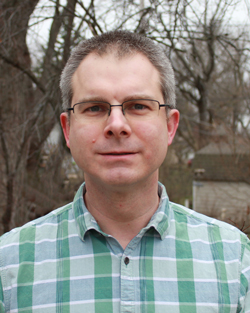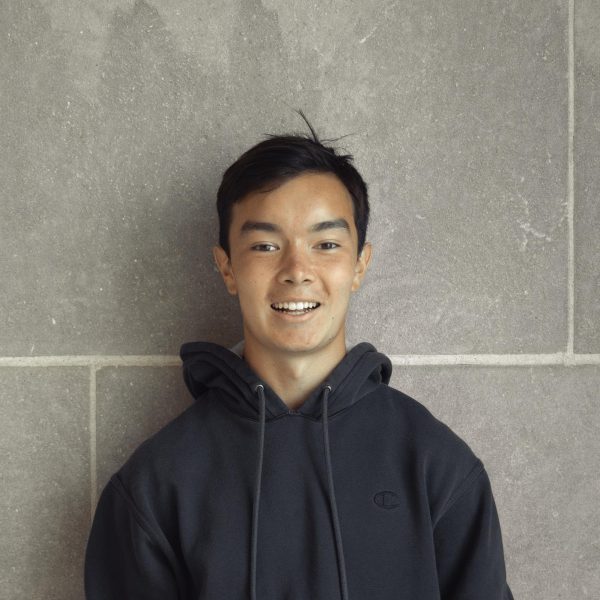2023 Board of Education candidate Q&A: Joe Kozminski
March 26, 2023
This Q&A is a part of The Central Times’ coverage of the 2023 Board of Education election. The election will take place on April 4. For more information, click here.
The following Q&A has been edited for length and clarity.
Q: Can you describe your professional background outside of being a board member?
A: I’m a physics professor at Lewis University. Been in that role for 18 years. I’ve been a department chair for over a decade there. I also engage in K 12 stem outreach activities through the University. I’m also in some committee leadership roles and the American Association of Physics Teachers and in the Advanced Lab Physics Association. I’m trained as a high energy physicist. I worked in Fermilab and I’ve done some physics education research as well. My current research is actually in climate vulnerability inputs, like air quality and urban heat islands. And we’re doing some air quality monitoring in the Joliet area.
Q: So what’s your connection to District 203? Were you a student here, or do your kids go
here? No, I wasn’t a student here. I actually grew up in Michigan. I moved down here in graduate school when I was at Fermilab to the Chicago area. I lived in Naperville for a year during graduate school and then moved into the city. We moved back out here about eight and a half years ago, about five days before my kids started first grade. So the schools were a big priority. District 203 had great schools, a great district.
Q: How long have you served on the Board of Education?
A: I’m finishing my first term, so four years.
Q: So four years ago, when you ran for your first term, what inspired you to run? Why did you want to serve in this position?
A: I think there were several things. I had several friends who are scientists who were starting to run for political office and I think the skill set I have is a little different than a lot of other elected officials. I’m very data driven, very analytical. And as I said, I have three kids in the district. I actually applied for an open seat [on the board] the year before. I went through the interview process, so I was interested in serving on the board. And when I started digging into the data and saw some large achievement gaps in a very high performing district and some other things, it really showed that there’s work to be done and I thought I could contribute with my background in education and science.
Q: Aow after you served a full term, why are you still committed to this office? Why do you want to run for re-election?
A: My passion is education. I’m in higher education, but we need strong K-12 systems in order to get kids ready for college. Not every kid’s going to college, some are going to get right into the workforce as well. So we need strong preparation and we need to keep that top quality education and make sure that all students are able to access that top quality education, they have the support they need to succeed in whatever path is right for them. And we still see achievement gaps in the data. I think there are issues around sustainability within the district that we need to work on trying to reduce the district’s carbon footprint. And then we’ve started doing some really good things like rolling out the Comprehensive Equity Plan. Really getting recognition for the SEL programming in the district, rolling out things like MTSS (multi-tiered support systems) where we can look at the progress of every student individually and start making more individualized plans. That’s still a work-in-progress. I want to start looking at the data and making sure that all the resources are in the right places.
Q: Is there a single achievement or accomplishment that you’ve had within the board that you’re most proud of?
A: The board really works well together. We don’t work as individuals. I think that’s really important to note. The board has done some really, really good things. We’ve put two resolutions to the Illinois Association of School Boards in the last four years. One of them was on remote learning during snow days, and the other one was on advocating for more funding for electric or zero emission buses. The first one was taken up by IASB and approved by the full membership of the IASB. The bussing one unfortunately was not taken up for consideration by IASB. However, it is actually being looked at by a local House member. So we’ve made some progress on both of those resolutions, and actually the remote learning is for election days so that we don’t have to cancel school on election day.
Q: What are your big focuses for your next term? Are you looking for more changes, or to continue the status quo?
A: Certainly to continue to implement the pieces that we’re already working on. The Comprehensive Equity Plan is about two years old, maybe three years old now, and we’re still in the process of implementing MTSS, [which] was just rolled out a couple of years ago. I think one of the things that I really want to see coming out of COVID is [evaluating] “what is the data showing us now?” We’ve had a couple of years, one where we had almost no data collection in 2020, and then one year where we didn’t see a full snapshot.As a data person, I want to see more than one year of data before making big changes. So I think we have to see where we’re at and potentially shift some resources, maybe shift some priorities. But do that based on data, not assumptions that everything is the same as before. So we need to be responsive to where we’re at right now.
That’s the big thing. And then sustainability initiatives are something else that I’m particularly interested in during the second term.
Q: One thing that we’ve seen a lot over the past year is community and student input on curriculum changes. The decision to phase out Latin and implement the new changes to the music program have gotten a lot of attention from the community. What are your thoughts on students getting more involved with this, and the bigger response that you’ve gotten?
A: I think it’s great to hear the student voice. I’m really glad that students are coming out and sharing what they think. I think the student voice is important in those decisions. And we may or may not agree with them, but having that input is really important to hear where the student community is.
Q: As a member of the board, who do you believe it is that you represent? What is your job to do for those people?
A: Our focus is certainly the students. We’re trying to provide students the best quality education and make sure that students succeed, whatever path they decide to take, whether college or career or military or or what have you. We represent the whole community. So we need to listen to all of our constituents and that includes students, parents, teachers, and staff. Hear from all of the district, teachers, staff, administrators, and weigh all of the voices.
For more on the 2023 Board of Education election, click here.
For a profile on Kozminski, click here.








